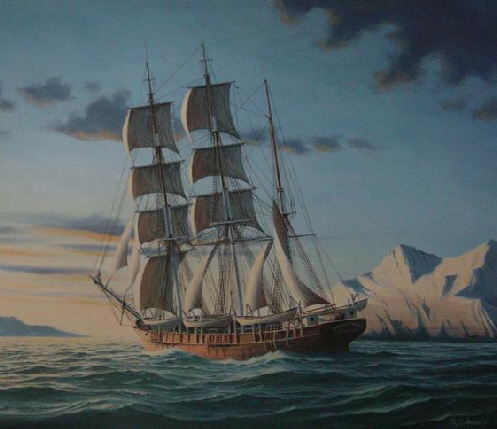Ranzo/Reuben Ranzo/ Renzo, è una halyard shanty, molto popolare sulle baleniere.
Reuben Ranzo (Renzo/Ranzo) forse dall’italiano Rubino Oronzo, rappresenta un tipico personaggio delle sea shanties: è un campagnolo e terricolo (a volte un sarto di professione) che si trova imbarcato su una nave; in alcune versioni l’imbarco è stato forzoso.
In altre ci si immagina che sia stato spinto verso il mare dalla necessità di trovare un lavoro. Ranzo è inizialmente dileggiato dagli altri marinai per la sua inesperienza (preso a pretesto per affermare la superiorità dei marinai sui terricoli) ma poi impara il mestiere e diventa lui stesso capitano della nave. Così almeno accade in alcune versioni, in altre intitolate più opportunamente “Poor R(e)uben Ranzo” il ragazzo non ne combina una giusta e passa da una disavventura all’altra.

Ranzo/Reuben Ranzo/ Renzo is a typical halyard chanty, very popular on the whaling ships.
Reuben Ranzo (Renzo), perhaps from the Italian Rubino Oronzo, is a character of the sea shanties: he is a terricolous (sometimes a farmer laborer or a professional tailor) who finds himself embarked on a ship (sometimes pressed).
In other versions he followed the sea by the need to find a job. Ranzo is initially mocked by the other sailors for his inexperience (used as a pretext to affirm the superiority of the sailors on the terricolous ones) but then he learns the trade and becomes himself the captain of the ship.
In other versions entitled “Poor R(e)uben Ranzo” he can’t do one thing right, and passes from one misadventure to another.
RIFERIMENTI
Roll And Go(p24-5),
Capstan Bars(p54-6),
American Sea Songs and Chanteys(p50-3),
Sea Songs and Shanties(p63-4),
Songs of American Sailormen(p70-1),
Shantymen & Shantyboys(p23-25),
Spin a Yarn, Sailor(words only)(p110-1),
Naval Songs(p4),
Music of The Waters(p19-20, 33),
Chanteying Aboard American Ships(p89-91),
Songs of Sea Labour(p25),
A Book Of Shanties(p47),
Shanties And Sailors’ Songs(p175-6),
Songs of the Sea(p126),
An American Sailor’s Treasury(p56-9),
Songs of the Sailor and Lumberman(II)(p23-5),
The Way Of The Ship(p64-5),
Shanties from the Seven Seas(p175-8),
Shanties from the Seven Seas (complete)(p240-3),
The Seven Seas Shanty Book(p38),
Songs of the Sea & Sailors’ Chanteys(p252-3)
[ Roud 3282 ; Ballad Index Doe023 ; trad.]
WHALING SHANTY
Nelle versioni a lieto fine Ranzo riesce a fare colpo sulla figlia del capitano, che si prende cura di lui e lo istruisce nelle cose del mare (e non solo). Sebbene la tradizione non vedesse di buon occhio la presenza di donne a bordo delle navi, non era insolito che sulle baleniere s’imbarcassero le mogli degli ufficiali o perlomeno del capitano, non disposte a restare a terra da sole per i sei e più mesi della ferma.
In the happy ending versions Ranzo manages to impress the captain’s daughter, who takes care of him and instructs him in the things of the sea (and not only). Although tradition disapproving to the presence of women aboard ships, it was not unusual for the wives of the officers, or at least the captain’s one, to board the whaling ships, not willing to remain alone for six or more months.
O, Renzo was no sailor,
Renzo, boys, Renzo!
He was just a stitchin’ tailor,
Renzo, boys, Renzo!
He was pressed on board a whaler,
Where he was a hopeless failure.
The Captain gave him thirty,
His daughter begged for mercy.
She took him to her cabin,
Which got the crew a-jabbrin’.
She gave him cake and water,
And a bit more than she ought to.
She gave him rum and whiskey,
Which got him spry and frisky.
She taught him navigation,
That cursed occupation.
Now Renzo is the skipper,
Of a leaky Blackball clipper.
He’s known wherever whalefish blow,
As the worst damned captain on the go.
Renzo non era un marinaio
Renzo ragazzi, Renzo
era solo un sarto su misura
Renzo ragazzi, Renzo
Fu imbarcato a forza su una baleniera:
dove era un disastro senza speranza.
Il Capitano gliene diede trenta (frustate)
sua figlia supplicò pietà
lo portò in cabina,
facendo arrabbiare l’equipaggio.
Gli diede dolci e acqua
e un po’ di più di quanto avrebbe dovuto.
Gli diede rum a whiskey
che lo rese bello pimpante.
Gli diede un’istruzione (marinaresca)
e gli insegnò la navigazione.
Ora Ranzo è il capitano
del clipper della Blackball
è rinomato ovunque ci sia la caccia alle balene
ed è il capo più tosto dei mari
Oh poor old Reuben Ranzo,
Oh Ranzo was no sailor
but he shipped on board a whaler(1).
Ranzo joined The Beauty(2),
And did not know his duty.
They gave him lashes thirty(3)
because he was so dirty(4)
The captain ‘s daughter Suzy
she begged her dad for mercy
Oh, she give him wine and water
And a bit more than she ought to
She gave him education
she taught him navigation
Now Ranzo is a sailor (5)
he’s captain of that whaler,
Now he’s known wherever
them whale-fish blow
As the hardest master on the go
FOOTNOTES
1) the work on the whaling ships was hard but profitable, among the sailors of the high seas there was the conviction that the “whalermen” were not real sailors, but earthlings who chose the sea to make money
2) or: ” Ranzo was no beauty“
3) la fustigazione in caso di negligenza era una prassi comune per i tempi specialmente per mantenere la disciplina sulla nave
4) probabilmente si riferisce al ponte della nave non abbastanza pulito
5) the stanza in A.L. Lloyd is different: Well, he got his first mate papers, he’s a terror to the whalers
Povero vecchio Ruben Ranzo!
Ranzo non era un marinaio
ma si imbarcò su una baleniera(1):
Ranzo raggiunse la Beauty(2)
e non sapeva fare il suo dovere.
Gli diedero trenta frustate(3)
perchè era così sporco(4).
La figlia del capitano Susy
supplicò il padre perchè avesse pietà
e gli diede vino e acqua
e un po’ di più di quanto avrebbe dovuto.
Gli diede un’istruzione (marinaresca)
e gli insegnò la navigazione.
Ora Ranzo è un marinaio(5)
ed è il capitano di questa baleniera,
è rinomato ovunque
ci sia la caccia alle balene
ed è il capo più tosto dei mari
NOTE
1) il lavoro sulle baleniere era duro ma remunerativo, tra i marinai d’alto mare c’era la convinzione che i “whalermen” non fossero dei veri marinai, ma terricoli che sceglievano il mare per fare soldi
3) la fustigazione in caso di negligenza era una prassi comune per i tempi specialmente per mantenere la disciplina sulla nave
4) probabilmente si riferisce al ponte della nave non abbastanza pulito
5) la strofa in A.L. Lloyd: Well, he got his first mate papers, he’s a terror to the whalers
JOHN SHORT VERSION: Rando
“Hugill cites this particular shanty as a classic example of the habit of overlapping verse and chorus between shantyman and crew – a technique we have kept to. Our text is all from Short except for Terry’s ‘turkey’ verse which we’ve included to give a reason for the flogging – as if one were needed. It is the only element in the text which, most collectors point out, is variable – the rest being noticeably consistent.” ((Short Sharp Shanties))
“[Stan] Hugill cita questa particolare shanty come un classico esempio dell’abitudine di sovrapporre versi e cori tra shantyman e ciurma – una tecnica che abbiamo mantenuto. Il nostro testo è tutto tratto da Short, tranne per il versetto Terry’s ‘turkey’ che abbiamo incluso per fornire una ragione per la frustata, se ce ne fosse bisogno.
È l’unico elemento nel testo che, la maggior parte dei collezionisti sottolineano come variabile – il resto è notevolmente costante.” (Short Sharp Shanties)
Barbara Brown in Short Sharp Shanties : Sea songs of a Watchet sailor vol 3

| Ranzo Boys Ranzo Oh Ranzo was no sailor he shipped aboard a whaler he shipped with Captain Taylor the man that shoot the sailor he couldn’t do his duty He could not boil the coffe the captain being a good man he taught him navigation he taught him to great things he gave him nine-and-thirty he gave him lashes thirty He stealed in a captain’s turkey And that was the end of Ranzo Oh poor Reuben Ranzo | Ranzo, ragazzi, Ranzo Oh Ranzo non era un marinaio s’imbarcò a bordo di una baleniera s’imbarcò con il Capitano Taylor l’uomo che sparava ai marinai non sapeva fare il suo dovere non sapeva bollire il caffè il capitano era un brav’uomo gli insegnò la navigazione gli insegnò grandi cose gli diede 39, gli diede 30 frustate rubò il tacchino del capitano e questa fu la fine di Ranzo Oh povero Ruben Ranzo |
LA VERSIONE SUI GRANDI LAGHI
La canzone era popolare come halyard shanty sia sulle navi inglesi che americane non necessariamente solo sulle baleniere. Si prenda come esempio questo testo in Windjammers: Songs of the Great Lakes Sailors, Ivan Walton e Joe Grimm (si cita come fonte Harry e George Parmalee 1932)
GREAT LAKES VERSION
The song was popular as halyard shanty on both the British and the American ships, not necessarily just on the whaling ships. See this text in Windjammers as an example: Songs of the Great Lakes Sailors, Ivan Walton and Joe Grimm (from Harry and George Parmalee 1932)
Oh poor old Reuben Ranzo (x2),
Ranzo me boys, Ranzo.
Oh Ranzo came up to the Lakes(1)
for sailors live on prime beefsteaks(2)
Now it’s a widespread rumor
that he skipped abroad a schooner
But Ranzo was no sailor
for Ranzo was a tailor
The old man set him wheeling
for Ranzo was appealing
but he could not rock or shake her(3)
for Ranzo was no sailor.
His course was up Lake Erie
but he grounded on Point Pelee(4)
the old man loud did curse him
Oh how the old man cursed him
He kicked him to the galley
with pots and pants to dally
When they came into agrain port(5)
the old man cut his sailin’ short
Now Ranzo knows the ocean
and the old man works for Ranzo.
FOOTNOTES
1) the Great Lakes of North America, a sort of Inland Sea between the United States and Canada
Povero vecchio Ruben Ranzo!
Ranzo ragazzi, Ranzo
Oh Ranzo venne fino ai Laghi(1)
perchè i marinai cucinano ottime bistecche(2),
ora è una diceria diffusa
che si imbarcasse su una goletta
ma Ranzo non era un marinaio,
bensì un sarto.
Il capitano lo mise al timone
perchè Ranzo era promettente,
ma lui non sapeva evitare di fare sbattere le vele(3),
perchè non era un marinaio.
La sua rotta era risalire il Lago Erie
ma andò in secca a Point Pelee(4)
il capitano lo maledì a voce alta!
Oh quanto lo maledì!
lo cacciò a calci in cucina
con pentole e padella per compagnia.
Quando arrivarono in un porto cerealicolo(5)
il capitano mise fine alla sua navigazione.
Ora Ranzo è esperto dei mari
e il capitano lavora per Ranzo
NOTE
1) sono i Grandi Laghi dell’America settentrionale, una sorta di Mare interno fra gli Stati Uniti e il Canada
2) perchè sulle navi che percorrono il sistema dei grandi Laghi si cucinino ottime bistecche è un mistero!
3) nota di Italo Ottonello: To shake the sails (Naut.)= to luff up in the wind, causing the sails to shiver. WEBSTER 1913 . E’ la cosa più importante per un timoniere
4) Point Pelee è una lunga e sottile striscia di terra che si perde nel lago Erie all’altezza dell’Isola di Pelee
5) nota di Italo Ottonello: sul lago si svolge un ingente traffico di minerali di ferro, carbone, cereali e legname
LINK
https://www.fresnostate.edu/folklore/ballads/Doe023.html
http://www.gutenberg.org/files/20774/20774-h/20774-h.htm#Reuben_Ranzo
http://archive.folx.org/tune/ruben-ranzo-spiersboden-version-1799
https://mainlynorfolk.info/lloyd/songs/reubenranzo.html
http://www.traditionalmusic.co.uk/folk-song-lyrics/Ranzo.htm
http://www.jsward.com/shanty/ReubenRanzo/index.html
http://www.contemplator.com/sea/ranzo.html
RANZO FAMILY
Ranzo Ray (The bully boat is coming)
Reuben Ranzo
We’ll Ranzo Way( Huckleberry hunting)
Wild goose shanty
Lampabbo Lampa! (stessa melodia Ranzo Ray)
